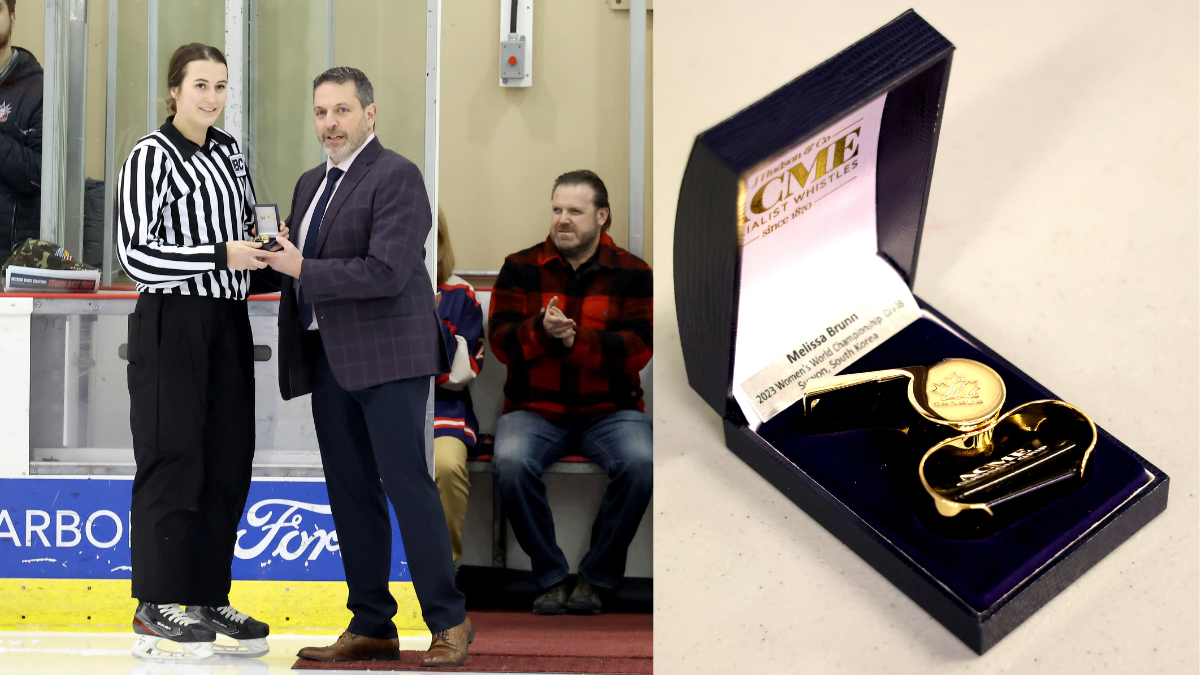Melissa Brunn, a Kootenay International Junior Hockey League linesperson since 2019, started officiating in her hometown of Kamloops in 2014. Nine years later, and back at home, she was presented with the Hockey Canada Golden Whistle for working the 2023 Women’s World Championship D1 in Suwon, South Korea. She has also received the Silver Plated Whistle.
Brunn began officiating to get more ice time and earn spare cash while she played senior hockey. She officiates in the Canadian Sport School Hockey League, B.C. AAA hockey, Women’s USport and high performance leagues in the province. Brunn’s goal is to officiate at the Olympics and in the Western Hockey League. She answered questions about the Golden Whistle and more. The interview has been edited for clarity and length.
KIJHL: What did it mean for you to receive the Golden Whistle for working the Women’s World Championship?
MB: It was nice to be recognized by fans during a presentation, especially in my hometown.

KIJHL: What was the valuable experience you gained from working that championship?
MB: That was my first international competition outside of the Rivalry Series, which isn’t considered international, but you’re seeing international teams. The tournament is playoffs because the top team of that division moves up and the bottom team is relegated. We have playoff energy from the first game. Getting into high level competition right away for six days, and having that high intensity energy right off the bat was refreshing. To know that they’re competing just as much as we are, small mistakes or catches can cost you a game and on the officiating side, those small catches can determine your assignments you later that week.
I learned what the international standard is for positioning, for skills and adjusting things from our home leagues. For me, I had to drop the puck differently and learn that standard and to be able to master it or improve and learn quickly. That’s the difference between being at home where we get to work from October to February and make some real big leaps and bounds, you had to leap and bound within six days. It’s very different at the international level.
KIJHL: You took part in the NHL Officiating Combine in Buffalo, what was that experience like and how did it help you?
MB: That was eye-opening. The interesting part is there’s a wide variety of people that attend.
The first couple days are fitness and mental strength. You are put through a fitness combine off-ice, do several tests in the morning and then I switched to on-ice testing in the afternoon. That was followed by another technical skate and then we went into playing and officiating games so you’re all selected onto teams. You ref one game, play another mini game and they’re looking for your understanding of the game, understanding rule application, and being able to apply the right calls at a bit of a higher speed. That’s why they bring in that variety to see who can keep up, who’s maybe a step away, who’s a few steps away and they organize it that way and pick out some prospects from that. It was nice.
KIJHL: How did you feel you performed?
MB: A bit low on the fitness testing side as it was a shock to the system. We don’t put ourselves through a ringer like that on a regular basis. I would love to be selected to return and be able to have that redemption round and show them how I’ve improved.
KIJHL: You began officiating in the KIJHL during the 2019-20 season, what was that experience like?
MB: My first game was in Summerland and my line partner forgot his pants and wore gray track pants instead. That’s my highlight of that game. It was a good experience to get my feet wet and more of an eye-opening season setting the foundation for what was to come in the next couple of years.
KIJHL: How has officiating in the KIJHL helped with your development and path to work higher level games?
MB: We get a wider variety of players and see teams that have different playing tactics and I think that’s helped in terms of seeing a variety of play.
KIJHL: How many games have you worked this season across all your leagues?
MB: My goal typically is to be 50 or under at Christmas. When you get into a bit more high performance, it does become more quality over quantity. By the end of the season, I will probably be just shy of 100. If I’m over, I know I’m probably on the verge of burning out.


























